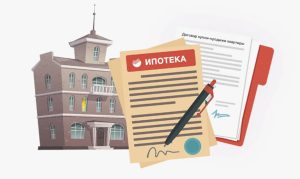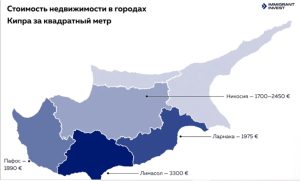This website uses cookies so that we can provide you with the best user experience possible. Cookie information is stored in your browser and performs functions such as recognising you when you return to our website and helping our team to understand which sections of the website you find most interesting and useful.
Getting a mortgage in Cyprus - what you need to know


1.Basic requirements for borrowers
Foreign nationals can obtain a mortgage in Cyprus on an equal basis with locals, but there are certain criteria that the bank will take into account when considering the application:
- Credit history: In order to obtain a mortgage, the borrower must provide evidence of their creditworthiness. This can be income statements, tax returns, bank statements and other documents.
- Down payment: As a rule, banks require a down payment of 20% to 40% of the value of the property to be purchased. The amount may vary depending on the type of property and bank conditions.
- Borrower’s age: In most cases, the age of the borrower at the time of repayment of the loan should not exceed 65-70 years. Accordingly, the term of the mortgage may be limited by the age of the borrower.
- Residency status: Although non-residents can obtain a mortgage, having a permanent or temporary residence permit in Cyprus can make the process much easier and improve the terms of the loan.
2.Loan Terms
Loan terms when applying for a mortgage in Cyprus depend on a number of factors, including the type of property, the size of the loan, the financial situation of the borrower and other parameters. In this section, we detail the key aspects of mortgage lending terms that you should consider when planning a property purchase.
3.Interest rate
The interest rate is one of the most important factors affecting the overall cost of a mortgage. In Cyprus, rates vary depending on the specific bank, the type of property, the term of the loan and the borrower’s level of credit risk.
- Fixed Rate: Some banks offer fixed interest rates for the initial period of the loan, usually for the first 1-5 years. This means that the rate does not change during this time, allowing the borrower to accurately plan their payments. After the end of the fixed period, the rate can be renegotiated according to market conditions.
- Floating Rate: Floating rates are usually linked to market fundamentals such as EURIBOR (European Interbank Offered Rate) plus a bank’s margin. This rate can change in response to fluctuations in the financial market, making loan payments less predictable, but can also be beneficial when market rates are falling.
- Hybrid rates: Some banks offer hybrid programmes that combine elements of both fixed and floating rates. For example, the rate may be fixed for the first few years and then switch to a floating rate. This can be an interesting option for those who want a fixed rate at the start but are prepared for possible changes in the future.
4.Down payment
The down payment is the amount that the borrower has to contribute towards the purchase of the property. In Cyprus, the amount of the down payment depends on the type of property, its value and the status of the borrower:
- Standard down payment: For most residential properties in Cyprus, the down payment is between 20% and 40% of the property value. For some types of properties, such as commercial property or land, the down payment requirements may be higher.
- Impact on loan terms: The higher the down payment, the more favourable terms banks can offer, as the risk to the lender is reduced. For example, a lower down payment may result in a higher interest rate or tighter loan terms.
- Special programmes: In some cases, banks offer programmes that allow for a lower down payment, but this may be accompanied by additional conditions such as mandatory insurance or a higher interest rate.

5.Loan term
The term of a loan is the period during which the borrower is obliged to repay the loan amount in full, together with interest. In Cyprus, mortgage loan terms vary depending on the borrower’s age, income and other factors.
- Standard term: Usually banks offer mortgages for terms between 10 and 25 years. In some cases, terms of up to 30 years are possible, especially if the borrower is young and has a stable income.
- Age Limits: It is important to keep in mind that most banks set age limits. For example, the borrower should be no more than 65-70 years old at the time of repayment of the loan. This means that if the borrower is 50 years old, the maximum term of the loan may be limited to 15-20 years.
- Flexibility of terms and conditions: Some banks allow you to change the loan term depending on the financial situation of the borrower. For example, it is possible to switch to a shorter term if the financial situation improves or lengthen the term in case of temporary financial difficulties.

6.Monthly payments and amortisation
Monthly mortgage repayments depend on the amount of the loan, the interest rate and the term of the loan. In Cyprus, there are different repayment schemes that affect the monthly payments:
- Annuity payments: This type of payment involves equal monthly payments throughout the term of the loan. In the beginning, most of the payment goes towards interest and only a small portion goes towards the principal. Over time, the principal portion of the payments increases.
- Differentiated payments: In this scheme, the size of the monthly payments decreases over time. The payments will be higher in the early years because the principal is paid off faster, but as the principal debt decreases, the amount of payments decreases.
- Flexible payments: Some banks offer programmes with the option of temporarily reducing payments or deferring payments. For example, in the event of temporary financial difficulties, the borrower can negotiate a temporary reduction in payments followed by an increase or extension of the loan term.
7.Additional costs
When applying for a mortgage in Cyprus, there are also a number of additional costs to consider, which can significantly increase the total cost of the loan:
- Property Insurance: Banks require compulsory property insurance, which protects both the borrower and the lender from potential losses in the event of damage or loss of the property. The cost of insurance depends on the type of property and its value.
- Borrower’s life insurance: Some banks require borrower’s life insurance, especially for high loan amounts. This guarantees repayment of the loan in the event of the borrower’s death.
- Notary and registration fees: Mortgage registration is accompanied by notary fees, as well as registration fees for registering the mortgage agreement with the Land Department.
- Bank fees: It is important to take into account possible fees for processing loan applications, for early repayment of the loan or for changing the terms of the agreement.
8.Statistics and market trends
The Cyprus property market continues to grow and mortgage lending plays a key role in supporting this growth. According to the Central Bank of Cyprus, mortgage lending in 2023 is expected to grow by 7% year-on-year. This is due to sustained interest from foreign investors as well as improved lending conditions offered by Cypriot banks.
- Property market: In 2023, the average value of housing in Cyprus increased by 5.2% compared to 2022, which also influenced the increase in demand for mortgages.
- Share of foreigners: Approximately 45% of all mortgages in Cyprus are granted to foreign nationals, indicating a high level of interest in Cypriot property.
9.Legal aspects
Purchasing a property using a mortgage loan in Cyprus is an important step that requires attention to legal details. The process involves several key steps that need to be carefully considered to avoid potential legal problems in the future. Let’s take a look at the main legal aspects to consider when taking out a mortgage in Cyprus.
10.Property title verification
The first and most important step when buying a property is to verify the seller’s ownership of the property. Before proceeding with the mortgage, it is important to make sure that the seller has all the necessary documents to prove his right to sell the property. It is important to check:
- Title Deed (Title Deed): This is the main document that proves ownership of the property. It must be registered with the Cyprus Land Department (Land Registry). If the seller does not have this document, the buyer risks legal problems such as third party claims.
- No encumbrances or liens: It is also important to ensure that the property is free from encumbrances such as unregistered mortgages, lawsuits or other restrictions that may prevent the transfer of ownership. This information is also verified through the Department of Lands.
- Property Ownership History: In some cases, it may be helpful to review the property’s ownership history to ensure that there are no previous disputes or legal complications associated with the property.
11.Examining the terms of the mortgage agreement
A mortgage contract is a document that governs the relationship between the borrower and the bank. It is important to carefully review all of its terms and conditions before signing:
- Interest rate and its changes: It is necessary to understand how the interest rate is fixed and the conditions for changing it. For example, if the agreement provides for a floating rate, it is important to understand the risks of future increases.
- Repayment terms: Familiarise yourself with the terms of early repayment to avoid potential penalties. Some banks may charge fees for early repayment, especially in the early stages.
- Fines and penalties: It is important to research what penalties are available for late payments. This will help you avoid unexpected additional charges.
- Bank’s rights to the property: Usually, the mortgage agreement stipulates that the bank is entitled to the property in case of default on the loan. This clause should be clearly spelt out so that there are no misunderstandings in the future.
Legal expertise and involvement of a lawyer
12.Hiring a qualified lawyer is a key step in the mortgage process in Cyprus.
Engaging a qualified solicitor is a key step in the mortgage process in Cyprus. A lawyer fulfils several important functions:
- Due diligence of the transaction: The lawyer conducts a comprehensive review of all documents related to the purchase of the property and the execution of the mortgage. This includes checking the title of the property, examining the terms of the mortgage agreement and all related documents.
- Document preparation: The lawyer can assist in the preparation of all necessary documents for the registration of the transaction, including drafting or reviewing the sale and purchase agreement and mortgage agreement.
- Representation of the client’s interests: ons with the bank and other parties to the transaction. He makes sure that all terms of the transaction are transparent and protect the client’s interests.
13.The lawyer represents the client’s interests in negotiati
Registration of the mortgage with the Department of Land ResourcesOnce the mortgage agreement has been signed, it must be registered with the Cyprus Land Department. This step is mandatory and serves as an official confirmation of the mortgage of the property in favour of the bank. Registration of the mortgage includes the following steps:
- Applying for registration: The lawyer or the bank’s representative submits an application for registration of the mortgage agreement to the local office of the Land Department. The application specifies all the main terms of the agreement, including the loan amount, interest rate and mortgage term.
- Payment of the state fee: A state fee is charged for mortgage registration, the amount of which depends on the loan amount and other parameters of the transaction.
- Receiving confirmation of registration: After the registration is completed, the Department of Land Resources issues a confirmation that the mortgage has been registered and the property is pledged to the bank until the loan is repaid in full.
14.Tax obligations and other legal costs
When applying for a mortgage and buying a property in Cyprus, tax obligations and related costs must also be taken into account:
- Property Transfer Tax (Transfer Fee): This tax is payable on the transfer of ownership of a property and is calculated according to the value of the property. Tax rates may vary depending on the amount of the transaction and the terms offered by the bank.
- VAT (VALUE ADDED TAX): Depending on the type of property and its value, Value Added Tax (VAT) may apply. The standard VAT rate in Cyprus is 19%, but preferential rates may apply for primary residences.
Property and life insurance for the borrower: Banks usually require insurance on the property being purchased and, in some cases, on the life of the borrower.
- in some cases, the life of the borrower. These are mandatory conditions that should also be taken into account when calculating costs.
15.Risks and tips
A mortgage is a long-term commitment, so you need to assess all the risks and your financial options before signing a contract. Important:
- Evaluate possible interest rate changes: If market conditions change, your mortgage rate may increase, resulting in higher monthly payments.
- Calculate a contingency reserve: Be sure to set aside a financial reserve for unexpected expenses such as repairs or temporary loss of income.
- Research the market in advance: Before buying a property and applying for a mortgage, it is worth researching the market thoroughly so that you can choose the most suitable property and avoid overpaying.
Conclusion
Taking out a mortgage in Cyprus is a complex process that requires a thorough understanding of local legal regulations, financial conditions and the property market. In order to avoid mistakes and protect your interests, it is essential to approach this process with full responsibility and carefully consider each step.
Almanova Law specialists are ready to provide you with comprehensive support at all stages of the mortgage process. We will help you:
- Conduct legal due diligence of the transaction: We will check all documents for legality and absence of risks.
- Study and understand the terms of the loan agreement: We will explain all the nuances so that you can make an informed decision.
- Organise and support the mortgage registration process: We will ensure that all legal procedures are correct and timely.
- Optimise loan terms: We will find the most favourable terms and minimise additional costs.
By contacting Almanova Law, you will not only receive professional assistance, but also the assurance that all stages of the transaction will be carried out as efficiently and safely as possible. We will make sure that the mortgage process goes smoothly so that you can concentrate on realising your plans to buy property in Cyprus.






